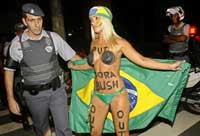Brazil police clash with protesters demonstrating against Bush visit
Police clashed Thursday with students, environmentalists and left-leaning Brazilians protesting a visit by U.S. President George W. Bush and his push for an ethanol energy alliance with Latin America's largest nation.

Protesting students also lobbed rocks and homemade explosives called "potato bombs" at riot police on a university campus in the Colombian capital of Bogota, where Bush is scheduled to visit on Sunday as part of his five-nation tour of Latin America.
In Sao Paulo, officers fired tear gas at protesters and beat them with batons after more than 6,000 people held a largely peaceful march through the financial heart of South America's largest city, sending hundreds of demonstrators fleeing and ducking into businesses to avoid the mayhem.
Authorities did not immediately report any injuries, but Brazilian media said at least six people were hurt and photographers took pictures of injured people being carried away.
Protesters said scuffles broke out when some radical demonstrators provoked officers and threw sticks at them but said police overreacted. A police officer who declined to give his name in keeping with department policy confirmed that extremists appeared to cause the confrontations.
After the clash, the protest continued peacefully but with far fewer people. The marchers waved communist flags and railing against Bush, the war in Iraq and the ethanol proposal. Almost all had departed by sundown, just as the U.S. president was to arrive in Sao Paulo.
At Bogota's National University, 200 masked students clashed with 300 anti-riot police carrying shields and helmets, spray-painting anti-U.S. slogans on walls and shouting "Out Bush!"
Police fired water cannons and tear gas, and the students hurled back rocks, fireworks, a few Molotov cocktails and dozens of "potato bombs" small explosives made of gunpowder wrapped in foil. There were no immediate reports of injuries or arrests.
The demonstrators called for the scuttling of a U.S.-Colombia free trade agreement signed in November and currently stalled in the U.S. Congress, and accused Washington of meddling in the South American nation's internal affairs by sending it some US$700 million (EUR530 million) a year in mostly military aid to fight drugs.
And in the southern Brazilian city of Porto Alegre, more than 500 people yelled "Get Out, Imperialist!" as they marched to a Citigroup Inc. bank branch and burned an effigy of Bush.
Asked about the protests, White House spokesman Gordon Johndroe said Bush "enjoys traveling to thriving democracies where freedom of speech and expression are the law of the land. He has a positive agenda here that we believe the people of Brazil and the rest of the Americas will benefit from."
Some protesters in Brazil carried stalks of sugarcane used to make ethanol in Brazil and a banner reading: "For every liter of ethanol produced, 4 liters of fresh water are consumed, monoculture is destroying the nation's greatest asset."
"Bush and the United States go to war to control oil reserves, and now Bush and his pals are trying to control the production of ethanol in Brazil. And that has to be stopped," said Suzanne Pereira dos Santos of Brazil's Landless Workers Movement.
Activists from the environmental group Greenpeace warned that increased ethanol production could lead to further clearing of the Amazon rain forest as well as cause social unrest, since most sugarcane-ethanol operations are run by wealthy families or corporations that reap most of the benefits while the poor are left to cut the cane with machetes.
Bush has spoken approvingly of Brazil's ethanol program, which powers eight out of every 10 new cars. The proposed accord is meant to help turn ethanol into an internationally traded commodity and to promote sugarcane-based ethanol production in Central America and the Caribbean.
After talks here with President Luiz Inacio Luiz da Silva, Bush will head on Friday to Uruguay, where he will meet with President Tabare Vazquez.
Bush will not visit Argentina. However, leftist Venezuelan President Hugo Chavez will travel to Buenos Aires to lead protests against Bush on Friday.
Brazil is mounting what has been described as its biggest security effort ever in Sao Paulo. About 4,000 agents including Brazilian troops and FBI and U.S. Secret Service officers will be on hand during Bush's almost 24-hour visit.
Colombia, meanwhile, is beefing up security in the capital for the first visit by a sitting U.S. president since Ronald Reagan in 1982. An additional 7,000 security agents will patrol the capital, for a total of 21,000, reports AP.
In Mexico, which Bush is scheduled to visit Tuesday, about two dozen demonstrators gathered in front of the U.S. Embassy in the capital chanting slogans against the U.S. project to construct border fences and Bush's visit.
Carmelo Ramirez Reyes showed up for the protest in a devil's mask, carrying a placard reading "My name is George Bush, killer of Mexicans."
Subscribe to Pravda.Ru Telegram channel, Facebook, RSS!





